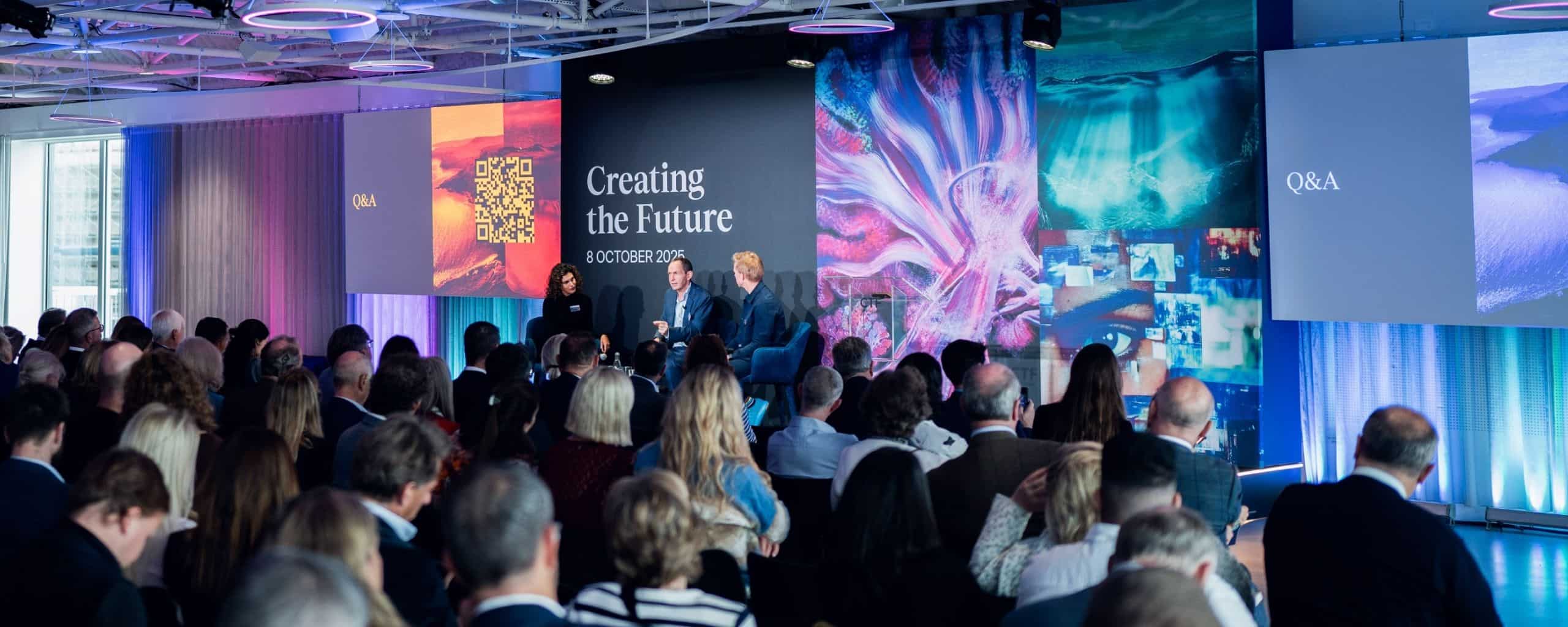
This year we hosted our fifth and biggest Creating The Future conference yet. Four hundred guests gathered at the Science Museum where, framed by fantastic views across the city of London, we listened to eight experts from three diverse fields give their insights on the current state of the world and share their visions for the future.
Our Creating The Future conference was conceived in 2017 as a way to explore some of the greatest challenges of our times and the approaches and technologies emerging to confront them. The issue with this of course, is that it’s not easy to be confronted with all the biggest issues of the current day in one afternoon. It is therefore a huge credit to our speakers that the event was inspiring, sparked curiosity and started a myriad of conversations between attendees.
The past few years have seen a rise in climate-related disasters, development of technology at a rate we can hardly keep up with and a rise in chronic mental and physical health conditions across generations. As the world continues to change rapidly, it is more important than ever we take pause, come together, and inspire each other to try and positively shape our future – if not for ourselves, for our children and grandchildren.
Watch the highlights from Creating The Future 2025 here
Planet
Academic Mike Berners-Lee, author of “There is no Planet B” spoke about the polycrisis confronting our planet as a result of human activity and how we are at a critical point in time, facing our last opportunity to protect our children and grandchildren from climate disaster. He argued that as individuals we should focus on respecting the environment, our fellow humans and the truth, and that we should be pressuring those in power to do the same.
Dr Diva Amon took us on an adventure to explore the wilderness of the deep ocean and the creatures that live there. She introduced us to the male angler fish that in the act of reproduction becomes permanently fused to the body of the female, more than 60 times larger than him. We learned, too, about the Greenland shark that can live for over 400 years. Dr Amon shared some of the shocking human impact she has discovered on submersible dives, including a wasteland of rusty fridges that fell off a container ship. More than 10,000 containers are lost at sea each year, littering and polluting the ocean bed. She explained the intrinsic value of the deep sea and how our survival as a species depends on it.
Technology
We heard about the experiences of the incredibly brave Dr Julia Ebner who has gone undercover in her research to understand the motivations and recruiting strategies of extremists. We learned how extremist groups use social media to spread their message and ideas to the mainstream, often targeting young people specifically.
Defence technology expert Nick Sharpe educated us on the history of warfare and the role of technology in current conflicts, including cyber operations by Russia in the war against Ukraine. He also highlighted the need to ensure that AI integration into defence technology does not create opportunities for fully autonomous warfare.
Health
Emma Whitcombe from Alzheimer’s Research UK, our charity partner, informed us of the current position of the charity in its efforts to find a cure for the million people in the UK suffering from dementia. While we heard about the vast impact this disease has on families, we also were given hope that new treatments are being found that slow its progression and learned about the lifestyle changes we can all make now to try and reduce our risk in the future.
We learned of the importance of community and connection for health by Dr Linda Mizun, a doctor whose own recovery from a chronic illness inspired her to try and improve people’s treatment outcomes by creating virtual neighbourhoods. These have helped reduce GP visits by 40% in communities where they have been trialled.
Dr Alex George is another remarkable academic with a powerful personal story. The suicide of his younger brother has inspired him to campaign for improved mental healthcare for young people. In a compelling talk he highlighted how there are 270,000 children currently on waiting lists for mental health treatment in the NHS. He explored how social media has displaced other activities vital for mental fitness and shared how he is working with the government and mental health charities to improve access to support.
We finished our afternoon with Tim Spector OBE, who shared the results of his work to understand the role and importance of our gut microbiome. He stressed the need for personalised nutrition to help us improve our health and wellbeing and reduce chronic inflammation. Tim left us with a challenge: eat more fermented foods and consume at least 30 plants a week.
Positive change
During his talk, Mike Berners-Lee quoted American writer and civil rights activist James Baldwin, who once wrote: “Not everything that is faced can be changed, but nothing can be changed until it is faced”. This speaks to the heart of Creating The Future. We hope those who attended came away feeling they hold some power, however small, to make positive change.